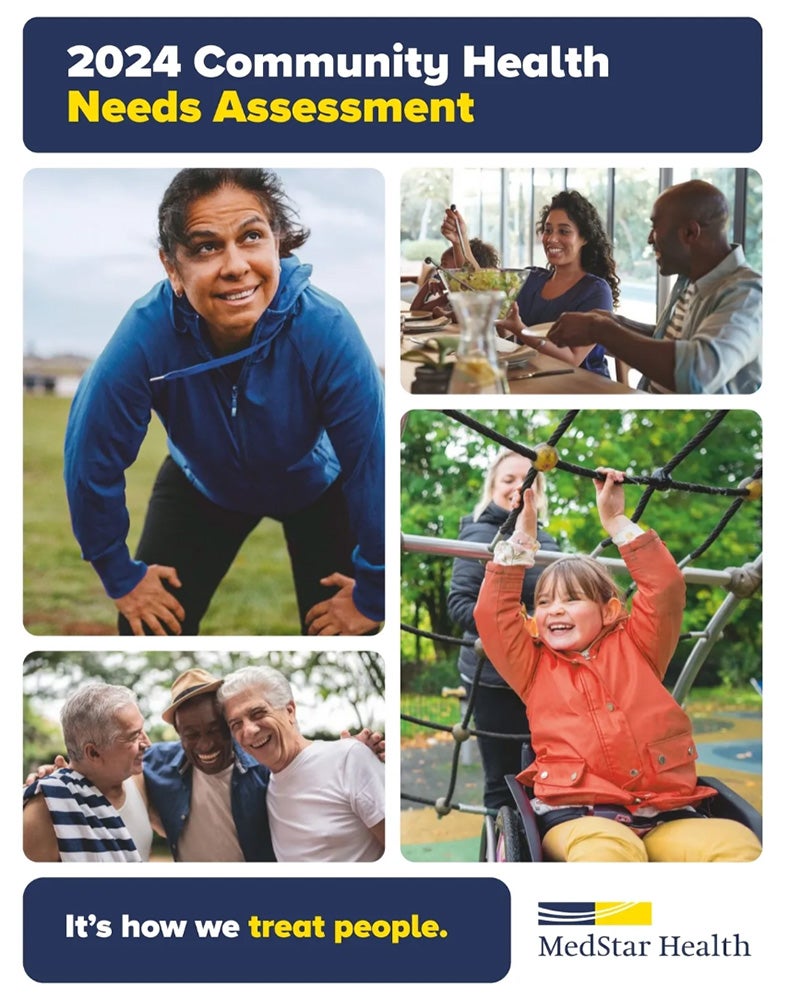School of Health Students Analyze Data for MedStar Health’s Community Health Needs Assessment
(July 9, 2024) — With substantial contributions from Georgetown’s School of Health, MedStar Health has released its 2024 Community Health Needs Assessment (CHNA), a comprehensive examination of local health needs conducted every three years as mandated by the Affordable Care Act (ACA). The CHNA shapes the framework for community health initiatives and the allocation of resources for future fiscal years across MedStar Health’s 10 regional hospitals, which stretch from Baltimore to Washington, D.C., and southern Maryland.
MedStar Health partnered with the School of Health to capture and analyze data for the CHNA derived from the 10,323 surveys and 16 community-input sessions with more than 200 participants. Christopher King, PhD, MHSc, FACHE, dean of the School of Health, estimated that between October 2023 and June 2024, School of Health students spent 200 hours working on the CHNA.
“This work really speaks to the mission of the School of Health to advance the health and well-being of people locally, nationally and globally through innovative research, the delivery of interdisciplinary education, and the transformative engagement of communities,” said King. “It’s a wonderful experience for students, it deepens our partnership with MedStar Health, and it is helping to uncover root causes of poor health throughout the region.”

Christopher King, PhD, MHSc, FACHE
King, who personally oversaw the School of Health’s work on the CHNA, has been involved with the assessment from its inception over a decade ago while serving as first assistant vice president of community health at MedStar Health, the position he held prior to joining Georgetown.
Health Shaped by Community
Through rigorous data analysis, the CHNA aims to show that the health of individuals is intrinsically linked to the health of their communities.
“At the School of Health, we learn about cura personalis, care for the whole person. That includes social determinants of health,” said Joie Hucko (H’25), a health systems administration graduate student who worked on the CHNA. “There are so many barriers to care for patients that we don’t see working in a hospital, which is why it’s so important to find out more about the environments people are living in that impact their health outcomes.”

Joie Hucko (H’25)
“Working on the CHNA allows students to think broadly about improving patient health,” said King. “For example, if a doctor in a clinical setting recommends a patient exercise, but then that person lives in a community where it’s not conducive to exercise, you see how a person’s environment affects their health.”
The CHNA documents the health of counties and ZIP codes surrounding MedStar Health’s regional hospitals, which are located in different communities from urban to rural, allowing students to see different lived experiences.
For example, in urban DC, respondents expressed great concerns over substance abuse and mental health, while community members in rural southern Maryland described challenges that they face scheduling appointments with providers, particularly specialists.
Practical and Personal Data Collection
“Students took on several responsibilities in creating the report, from pulling secondary data to attending community meetings,” King said.

Amelia Bedri (G’20)
Students started creating the report using national data collected by the U.S. Centers for Disease Control and Prevention (CDC). “It’s important to start with the national data to see how Maryland compares to other states and how counties and ZIP codes compare within the area to understand the makeup of the population served by MedStar Health,” said Amelia Bedri (G’20), a Master of Science in Health Systems Administration alum who worked with King on the 2021 MedStar Health CHNA.
Bedri, who also works full time as a senior content engineer with the National Committee for Quality Assurance (NCQA), led a team of three School of Health students in their work for the 2024 CHNA. In addition to demographic information such as race and employment status, students also compared health data to uncover top health concerns for areas, including rates for diabetes, hypertension and cancer.
“We’re trying to tell the story of the landscape that MedStar Health hospitals are operating in by county and even ZIP code,” said Bedri. “As we start to compile all of the demographic and health information, we can see that poor health outcomes in communities are connected to things like lack of employment, insurance and transportation accessibility.”
Students then compared the CDC data with feedback from MedStar Health patients collected through surveys and community health meetings. The community health meetings revolved around a series of structured questions led by MedStar Health staff; Georgetown students captured key themes from attendees.
“I attended a community meeting with MedStar Montgomery Medical Center to capture patient feedback,” said Hucko. “A common theme from the meeting was that a lot of patients weren’t aware of the resources available to them through MedStar Health, such as transportation assistance services.”

Sylvie Bissell (H’26)
“People spoke more about social determinants of health and less about clinical care received at the community meetings,” said Sylvie Bissell (H’26), a global health major who attended community meetings in Maryland, near Baltimore. “Comments focused on concerns about access to food, access to transportation, and crime in the area.”
“The community meetings provide important qualitative data about patient concerns that is otherwise difficult to capture,” added Bedri.
Future Uses For CHNA
The MedStar Health CHNA emphasized the critical need for increased access to health insurance, assistance with the cost of health care services, access to specialty providers and transportation to and from medical appointments.
“There are a lot of barriers to care for individuals, and working on the CHNA showed that as a health care system, we need to do better, especially in increasing those lines of communication with community members about how to improve quality of care,” said Hucko.
“The CHNA really paints a holistic picture about what it takes to improve health,” said King. “The report is an important resource for MedStar Health for strategic decision-making.”
Bissell, who got involved with the CHNA after King visited one of her global health courses and mentioned the project, hopes the data she helped collect will be used to enhance services and improve community health.
“The experience definitely made me more interested in working in the U.S. health care system,” said Bissell. “I’m really passionate about community-driven health initiatives, and hopefully in my future career, I’ll be in a position to use information gathered by projects like the CHNA to improve health outcomes.”
For Bedri, she hopes the CHNA inspires greater empathy throughout the health care system, from administrators to providers. “Health is often thought of as an individual responsibility, but when you go beyond reading a patient’s chart and actually engage with people, you understand so much more about what’s driving their health needs, and often that comes from outside the hospital itself,” said Bedri.
Heather Wilpone-Welborn
GUMC Communications

